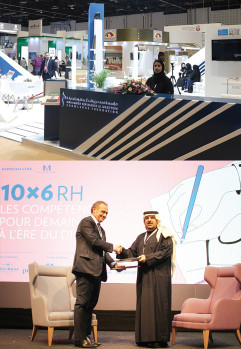MBRF Launches Al Ghani Al Zaher Dictionary at Abu Dhabi Book Fair
MBRF Launches Al Ghani Al Zaher Dictionary at Abu Dhabi Book Fair
One of the highlights of the participation in the Abu Dhabi International Book Fair 2019 by the Mohammed Bin Rashid Al Maktoum Knowledge Foundation (MBRF) was its launch of the Al Ghani Al Zaher Dictionary. Distinguished both by form and content, the Dictionary includes the vocabulary of the ancient and contemporary Arabic language, as well as the language of literature and media, all placed in a meaningful context. The Dictionary was launched in the presence of the MBRF’s CEO, His Excellency Jamal Bin Huwairb, and lexicographer Dr. Abdul Ghani Abu Al Azm, in a gathering of writers, poets, and media professionals.
The work on the lexicon took several years to complete. It keeps abreast of the development of the Arabic language’s terminology and vocabulary. His Excellency Jamal Bin Huwairib praised the Dictionary, saying it filled a great knowledge gap in contemporary Arabic and would be an important linguistic reference for all Arabic speakers and specialists. He stressed the important role that Dr. Abdul Ghani Abu Al Azm played as its lexicographer, and paid tribute to his rich litany of past accomplishments in compiling dictionaries. A wide range of publications were launched at the Book Fair and a number of discussion sessions and workshops on an array of topics organized, with a strong presence of the public at the various events.
UNESCO Institute for Lifelong Learning Selects MBRF CEO for Governing Board
The UNESCO Institute for Lifelong Learning has appointed His Excellency Jamal bin Huwaireb, CEO of the Mohammed bin Rashid Al Maktoum Knowledge Foundation (MBRF), to its Board of Directors.
Founded in 1952 and headquartered in Hamburg, Germany, the Institute’s Governing Board serves a four-year term. H.E. bin Huwaireb will begin his term this year. This prestigious appointment is a significant honor for the UAE.
“MBRF’s objectives are aligned with those of the UNESCO Institute for Lifelong Learning, which also seeks to promote education, improve its quality, support scientific research, and build knowledge-based societies,” said H.E. bin Huwaireb.
“This development will strengthen our long-term partnership with the United Nations in education and knowledge, which has already resulted in various initiatives and projects that have benefitted the region and the world,” H.E. concluded. He thanked His Highness Sheikh Mohammed bin Rashid Al Maktoum, Vice President and Prime Minister of the UAE, Ruler of Dubai, as well as MBRF Chairman H.H. Sheikh Ahmed bin Mohammed bin Rashid Al Maktoum, for their continuous support for Emirati pioneers.
MBRF CEO Stresses Skills for the Future at PwC Upskilling Workshop
The Mohammed Bin Rashid Al Maktoum Knowledge Foundation (MBRF) has participated in the ‘Upskilling for the Future’ workshop organized by PwC Luxembourg, an affiliate of PricewaterhouseCoopers, the leading global firm in audit and assurance, tax and consulting services.
In his keynote speech, MBRF’s CEO Jamal Bin Huwaireb said: “The Fourth Industrial Revolution has created unprecedented opportunities across various sectors. Nonetheless, it has also produced numerous challenges, raising the bar in terms of skills required for the jobs of tomorrow. We must respond to these challenges by adequately training workers and investing in human capital.”
At the workshop, Dr. Laurent Probst, Partner, Economic Development, Digital transformation and Innovation at PwC Luxembourg, showcased the ‘Future of Knowledge’ report first launched by MBRF in partnership with the United Nations Development Program (UNDP) at the 2018 Knowledge Summit in Dubai. This report has been a trailblazer for identifying future areas of knowledge expected to drive the transition to knowledge-based societies and includes a pilot study covering 20 countries.
According to MBRF’s Bin Huwaireb: “With this report, we have sought to determine the fundamental skills that will be indispensable in the future, and then track countries around the world to verify their readiness to incorporate these skills into their academic curricula, improve the quality of education, and promote lifelong learning. This will effectively minimize the indirect impact that the skills gap can have on unemployed youth, while helping to make more progress on the sustainable development goals, particularly those pertaining to the quality of education and providing adequate employment for economic growth.”








